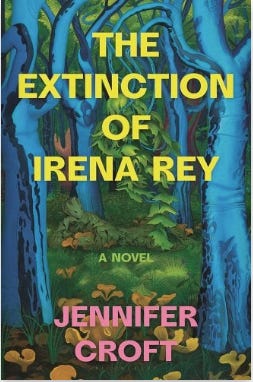Why are all the Polish ladies unreliable narrators?
Translation, The Extinction of Irena Rey, and Metafiction
Back in March, I wrote about how all of the Italian ladies were miserable. In part a reaction to A Sister’s Story, and my continued reflections on The Neapolitan Novels, this piece examined my experience with Italian ladies in contemporary literature. Well, now I’m back with more hard hitting questions for my European mutt heritage: namely, why are all the Polish ladies unreliable narrators?
In 2021, I read Olga Tokarczuk’s Drive Your Plow Over the Bones of the Dead. Tokarczuk won the Nobel Prize for Literature in 2018, and as a fellow countrywoman(ish), I felt it my literary and patriotic duty to read more of her work.
I’ve written about this before, but I’m half Polish. I take that heritage seriously as my name tends to obscure it. When I was 13, I got into an argument with my French teacher who insisted that Marie Curie was French.1 Though she was buried in France, Marie Curie was most definitely Polish.
This is apropos of nothing to say that when I heard about The Extinction of Irena Rey, a book about eight translators who arrive in Poland to translate for the mythical Irena Rey only for her to disappear, I was hooked. Once done, I was left thinking that all of the Polish2 books I’ve read have included unreliable narrators. And like anyone with an overactive, anxious brain, I had to analyze this further.
Unreliable Narrators or, Don’t Look Behind the Curtain
*Spoilers ahead*
Drive Your Plow Over the Bones of the Dead is about Janina Duszejko, an aging, but not yet elderly woman, living in a village in Silesia, near the border with Czechia.3 Parts of my family live in Lower Silesia, and this is in part what drew me into the book. This book is not metafiction, but just a straightforward narration in first person. The main plot involves a group of hunters dying in mysterious ways, and Janina proselytizing to her neighbors, the townfolk, and anyone who will listen, on the evils of hunting and the value of animals.
I won’t fully spoil all of it, but Janina is not telling the truth. We are somewhat aware of this, as her narration at times is confusing and overwrought with extended internal monologues about astrology, the nature of man, and how animals should be valued and respected. No complaint from me here on the animal bit, but it’s clear that she’s obscuring her true motivations, and as readers we’re along for the ride to understand why.
This works because the text is written in first person. Unreliable narrators generally only work in first person, though by all means, if you know of any unreliable 2nd or 3rd person narrations, do tell. First person is I - what I’m doing right now. It’s easy to control what your reader sees, hears, and witnesses, because the reader is only experiencing what I (me as narrator) is showing them. Even in these posts, I only write about what I want to write about - I remove everything else. Such is the case in fiction. Gone Girl is the novel that did this most effectively in recent history, but I do have some other options for you here. Unreliable narrators only work when we stay close to the main character; get any further away to take the blinders off, and we start to see the bigger picture and can introduce doubt into the narrative.
I did enjoy Drive Your Plow (the title is long, I’m not writing it any more), because Janina, as quirky a character as she was, at least stood on principle. We know she’s hiding something, but not what, and the climax is when the other characters in the novel confront her.
On the other hand, The Extinction of Irena Rey is metafiction - it in and of itself a comment on the nature of reality. Metafiction freaks me out: the point being as a reader, you’re supposed to constantly be questioning what is ‘real’ and who is being ‘truthful.’ The novel is ostensibly narrated by Emi, Irena’s Spanish translator, but a preface from another fictional character, Alexis, Irena’s English translator and Emi’s arch-nemesis for some reason, disabuses us of this notion right quick.
In this prologue, Alexis explains that Emi, who natively speaks Spanish, wrote the book in Polish, and now Alexis is translating it back into English. The book, though a work of fiction, is based on the ‘real’ translators of Irena Rey, and thus all the characters have been fictionalized, including Alexis herself.
On top of that, Alexis and Emi represent parts of author Jennifer Croft’s personality. Croft herself speaks English natively, but translates Polish, Ukrainian and Argentine Spanish. So the fight between Emi and Alexis is a fight between parts of her own personality and history. Oh also, all of these characters are fictional. Confused yet?
I enjoyed how Emi’s narration was constantly upended and undermined by Alexis’s footnotes. This was the highlight of the book for me, as someone who likes footnotes.4
Extinction (once again, long and I will be abbreviating) really had an interesting premise. The idea of translation, and what gets lots in translation and which version is more ‘real’ is a super interesting concept. I wanted it to work. But there were major problems that made it just an ok book for me: a solid lack of plot, and a truly insufferable main character.
The Narcissism of Thinking Everything is About You
There’s a stage of child development that I learned about in Psychology 100 that I can’t remember the name of. It’s past object permanence (the ability for a child to understand that an object still exists even if they can’t see it), and has to do with a similar concept for other humans - that other people still exist and have their own experiences even when they are not in our company. I can’t remember the name of this, so I am instead calling the lack of this ability: The Narcissism of Thinking Everything is About You™️. Gen Z might call it Main Character Syndrome, but I like my name better.
As much as we like to think that everything is about us, it’s really not. It’s a powerful reminder that we can just chill out, but some people *cough cough* Emi *cough cough* did not get this memo.
I hated Emi. She was as babyish as her name sounded. She was absolutely insufferable, bordering on idiotic. I truly didn’t understand how someone could reach adulthood and be this obtuse. Emi thinks she is portraying herself as worldly, but really comes off as a 17 year old girl who’s never heard of feminism who thinks it’s empowering to sleep with married men and the pinnacle of life is to be captured by the male gaze. She feels hurt that other people know things about the author that she doesn’t, that other people’s lived experiences are different than hers, and that they don’t share the collective hero worship that she ascribes to them. She cannot fathom why a colleague is still getting sick (she’s pregnant) and is so lost in her own head that by the end, I was rooting for the purported ‘mean girl’ rival Alexis to rip Emi a new one in the footnotes, because at least at that point, maybe some common sense would have gotten in. It’s truly a choice as a character to portray yourself as the most insufferable, oblivious version of yourself and think you’re coming out ahead. Given that I’m reacting this strongly, obviously the book was well written to provoke such a reaction.
Emi is the walking-talking poster child for #notlikeothergirls. Exhibit A, uttered when stalking the wife of the married man and coworker she’s trying to hook up with:
Her name was Bogdana - the feminine version of Irena’s husband’s name, immeasurably uglier than its masculine counterpart. It was a pleasant surprise to me, at first, that she herself was also ugly.5
Nothing more empowering that putting other women down! I have a whole photo album on my phone of quotes from this woman’s insane viewpoint, and I wanted to throw my iPad at the wall by the end. I’m all for an unlikeable protagonist, but even I have limits. We’re supposed to be rooting for Emi, and all I could think the entire time was: How are you this dumb?
The other issue with Extinction was its utter lack of plot. Yes, the missing author is the inciting incident, and the quest to find her is ostensibly the plot, but nothing happens. The remainder of the book is a series of vignettes in the style of what I like to call: people going places to do things. The translators go to the woods. They go to dinner. They go to visit the neighbors. They receive visitors. Ultimately, there is some work towards the end about unifying all of these themes, but it’s too little too late and means nothing. As Macbeth so aptly puts it, this book was “full of sound and fury, signifying nothing.”6
I can make do with books with no plot. I’m not the target audience, so I understandably will always have some difficulty with them. But give me a reason for no plot. This had none, other than trying to hard to actually mean something. Overall, a solid 3 star read.
Alexis: Keep being your bitchy self, girl. Hope you enjoy Ulaanbatar.
Emi: Grow up.
Great for: people who like metafiction,
Bad for: people who hate all of the above
What does Poland have to do with this?
For full context, Jennifer Croft, the author of Extinction, is the translator for Olga Tokarczuk, the aforementioned Polish author and Nobel Laureate. So Croft herself is not Polish, but she speaks Polish, and has spent lots of time in Poland. She even wrote parts of Extinction in Białowieża Forest, where most of the book takes place. The one book of Tokarczuk’s I have read, coincidentally, was not translated by Jennifer Croft. It’s the one where I see the most reference to here in that borderland Polish forests play a central part in the narrative. (Białowieża for Extinction, the Silesia region near Czechia in Drive Your Plow)
In both books, these borderland areas are where things happen without explanation. The woods act as a place where transformations occur, including the potentially magical and mystical. Removed from civilization, who are these characters, out in the woods? Both Janina and Emi look to gain parts of themselves by going into the woods, and ultimately look for answers to their internal turmoil there.
Both books feature unreliable narrators who think we will never see that they’re trying to pull over our heads as readers. They not only think they’re cleverer than they really are, but also that they can get away with the deception. I do not say this disparagingly in Janina’s case, I do in Emi’s.
But why Poland? Sure, any old country can have forests where mystical and transformative things happen. Any country can have unreliable narrators. Poland to me, is uniquely qualified to discuss the nature of reality.
The territory generally comprising Poland has existed for centuries, but Poland has had the deeply unfortunate luck of being situated between a number of more powerful, more aggressive countries. Poland did exist in various capacities, including the Polish Lithuanian Commonwealth in the 16th century, but the partitions of Poland of 1772, 1793 and 1795 effectively ended self determination for the Poles and Lithuanians. To put a long story short, Russia, Prussia and Austria all decided they wanted parts of Poland, and took them. Poland didn’t have the means to fight back, thus Poland as a sovereign state didn’t exist for hundreds of years. Its people still existed though, calling themselves Polish, living in territories that were theirs but ruled by other nations.
The modern state of Poland wasn’t founded until 1920.7 On my great-grandparents nationalization paperwork, their birthplaces are listed as Austria-Hungary. One of my great-grandfathers, who had already immigrated to the States, immigrated back to Poland at the outset of World War I to fight on behalf of the Polish Legion.8 Poland was then famously invaded on September 1, 1939 during World War II, and even at the end of the war, territory that had traditionally belonged Poland was annexed by Stalin to be a part of the USSR, leaving the Allies to give parts of what had historically been Germany to Poland.9 So Poland as a country - what does that mean? What does it mean to live in and belong to a country that has a strong sense of identity, and yet was not allowed to be a sovereign nation for much of its history?
As if this wasn’t enough reason to debate the nature of reality, Poland’s been going through it recently. Donald Tusk, former President of the European Council, which is a part of the EU, is now the Prime Minister of Poland, after years of quasi authoritarian rule by the Law and Justice Party. (The structure of the EU is very complicated, this doesn’t equate to American levels of executive power. The presidency rotates among all 27 member states, and that’s not even getting into the European Commission.) Among the Law and Justice Party’s greatest hits were effectively outlawing abortion, for which there were many protests and the current government is trying to overturn.
All of this makes for fertile territory for unreliable narrators. When the nature of reality is unstable, what’s there to make sense of? When the foundations of your country are constantly shifting, what is there to narrate? What is truth when everything is unreliable?
Ultimately, like with my Italian compatriots, I don’t have an exact answer here. But I noticed a trend, and couldn’t stop thinking about it.
I’m currently working my way through The Lullaby of Polish Girls by Dagmara Dominczyk. I’ve only had it checked out from the library for months now. This doesn’t appear to have any unreliable narrators, so maybe I’ll have more theories as to where this phenomenon comes from when I’m done.
Now that I’ve written about both the Italian ladies and the Polish ladies, I’m going to have to find something to write about for the Irish ladies. And thus, my exploration into the contemporary literatures of my ancestors will be complete.
No New Books Challenge ™️
If you’re thinking I forgot all about my No New Books Challenge, then you would be correct. I haven’t forgotten about it, but I certainly did forget to update it these past few weeks. But fear not, I have held strong.
Streak to Beat: 50 days (January 1st - February 19th)
Last streak: 25 days (August 20th - September 14th)
Current streak: 21 days (September 18th - Present)
I want to break my highwater mark from earlier this year, and with a bookish trip planned for mid-November, I am on track to succeed. Stay tuned for more details on that as I’ll have a few posts dedicated to that adventure in November.
Mug Moment of the Week
After last week’s dedication to mugs, I am back with another weekly dosage of drinking ware appreciation. Behold, this tankard.
Though this is technically a mug10, she is so big. This honestly reminds me more of a beer tankard, which makes me think of the following:

I got this mug/tankard/giantess from three wheel studio, a local pottery studio here in Providence that has a sign on their door saying: “No, we do not offer classes.”11 It makes me giggle every time I see it and honestly? Respect.
Steaming inside was warm apple cider. Not the alcoholic kind. Just apple cider, but warm. I’d argue this is the best part of a New England fall. Sure, alcoholic cider is great and all but have you ever had just hot apple cider? It’s transformative.
Also, this is my 100th post on Substack! Yay me and yay us for making it this far.
While she did eventually become a French citizen through her marriage to Pierre Curie, she was born Maria Skłodowska in Warsaw. She was also the first woman buried in the Pantheon in Paris of her own right. I won the argument.
Put a pin in this, we’ll come back to it.
Also known as the Czech Republic, but my understanding is that the government prefers to use Czechia now, so I will, too.
I regret nothing.
Croft, Jennifer. The Extinction of Irena Rey: A Novel. New York, Bloomsbury Publishing, 2024. Page 90.
Shakespeare, William. Macbeth. Wordsworth Editions, 1992. Act 5, Scene 5, lines 27-28.
If we really wanted to be pedantic, the modern state of Poland was founded in 1989 post Communism, but the idea that Poland itself was its own sovereign territory was seeded in 1918 at the end of World War I.
As the US was not involved in Wold War I yet, he had to go through Canada to immigrate. He then came back through Germany at the war’s end. Polish army flags are put on his grave every year in recognition of his service.
Wrocław, where many of my relatives live now, was Breslau. There’s a lot been written about this post war transition. The most informative book I read on this was: Uprooted: How Breslau became Wroclaw during the Century of Expulsions by Gregor Thum. Yes, this is what I do in my spare time for fun.
Philosophy was never my strong suit. I am not going to get into the distinction between what is a mug and what is a glass. Though I guess beer mugs are mugs, aren’t they? Whatever. It’s a mug because I say so.
You can even see the sign on Google Earth.










